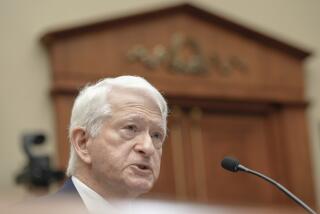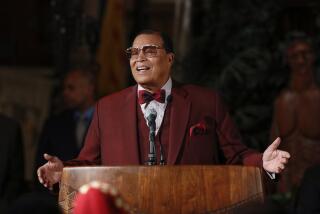Platform : On Farrakhan: ‘Come Hear the Man, Then Make Up Your Own Mind’
- Share via
Louis Farrakhan, minister of the Nation of Islam, gave an address sponsored by the Black Student Union at Cal State Northridge on Thursday. The following people offered their thoughts before the controversial leader spoke.
RABBI LAURA GELLER
Executive director of the American Jewish Congress, Los Angeles
I affirm the right of all people to be vigilant, even militant, in defense of their rights. But, nevertheless, I think all of us have the responsibility not to distort history, not to revert to racism, prejudice or stereotypes as we defend our own rights. Civility is a prerequisite to democracy. It’s unacceptable to intimidate other people through false accusations because that makes civil discourse impossible.
Minister Farrakhan’s attacks on Jews are not made with the purpose of rebuttal. They’re not meant to engage us in discussion. They’re not even an effort to communicate a message; but rather, I think, the intent is to communicate hatred and there’s no way to respond to that.
In my view, the problems of racism, the desperate economy, unemployment, the urban crisis--these are serious issues and they require serious engagement. I think Farrakhan corrupts the attempt to engage seriously in these issues and, by doing so, he’s really distracting all of us from the real agenda.
I think a difficult challenge to all of us is to understand that sometimes we have to distance ourselves from one of our own when that person’s rhetoric or ideology undermines reconciliation and healing. The American Jewish Congress was able to separate itself from Rabbi Meir Kahane’s message of racism even though he was a Jew. The instinct to heal must be greater than the instinct to hurt.
DAYNYELL GOOLSPY
Junior at CSUN, majoring in psychology
This is a college, isn’t it? Isn’t that the point of college, to present different viewpoints and open up discussion? Some people might think that Farrakhan is here to bash people. Well, that is not the case. This man has a lot of knowledge. He has a lot of education on the black experience. If anybody has any problems with what he is saying, then I suggest that they research the subject. But it goes beyond that. Instead of condemning or pointing fingers, I suggest people just come out and hear what the man says. Then you can make up your own mind. Don’t let the media make it up for you.
ELDER ISAAC PATRICK
Pastor of Gospel Light Church of God in Christ, Santa Ana
Let me first say that there are things that Rev. Farrakhan says that I cannot agree with. First of all, he is a Muslim and I am a Christian. But, even though we are not in agreement on some things, I still think his appearance at Cal State Northridge is a very good thing. What he says about the historical perspective of the black man in this country is accurate and not censored. People need to hear the man, not what the papers report. So much inaccurate information has already been written about him that there are many out there who have the wrong impression. Throughout history, those who tend to rock the boat were always the ones who were misunderstood by society. And in most cases, change has generally been their message. Rev. Farrakhan definitely rocks this boat.
FATHER JUAN SANTILLAN
Pastor, Our Lady Help of Christians Catholic Church, Los Angeles
My impression of (Farrakhan) is that he has focused (on) definite problem situations that do exist with the black community as far as institutional injustice against different civil rights. But at the same time, some of the methodology he (uses is) very forceful and very blunt. He dismisses the fact that there are other communities that are also going through the same injustices. And what hurts me the most is that with the history of the Hispanic people--and I’m not just talking about those who have managed to become citizens of the United States--Mexican-Americans have been bypassed completely in so many things.
Farrakhan is very, very well aware that there are other ethnic groups (struggling) within our society. His method, which I said is very blunt, builds fear--almost as a rejection of his being too strong.
Yet on the other (hand), can we as Mexican-Americans learn from him? Can he be a model for us? Is it that we, too, have to be blunt? It benefits much of what he has been fighting for, but (is he) creating animosities?
ARNOLD GATILAO
Senior at CSUN, majoring in journalism
Anytime you’re views are challenged, it is a positive thing. I for one want to hear (Farrakhan) speak. His views are controversial and I may not agree with the agenda of the Nation of Islam, but I still want to hear what he has to say. I know some Jews are not pleased that he is here. But I think that it is important for him to speak. He has the right.
NAZIR KHAJA
Physician and president of Islamic Information Service, Los Angeles
Minister Farrakhan has had an on-going difficulty with the main body of Muslims, who do not espouse racial animosity, superiority or name-calling of other religions because this goes totally against the grain of Islam. Not to say that Muslims believe that he’s doing that. But the fact of the matter is that from the religious point of view he has (adopted) the teachings of Elijah Mohammed (who brought) Islam into the (African)-American community in the 1950s and ‘60s--more of a political statement against the brutal experience of being oppressed. Considering the times, Elijah Mohammed’s own message mostly contained anti-white rhetoric; the main beliefs of Islam were hardly represented.
(For Muslims), controversy arises (from) certain ideas in his teachings on Farad Mohammed, (who) was supposed to be the teacher of Elijah Mohammed and God (on Earth). That is totally rejected by orthodox Islam.
I recently (interviewed) Minister Farrakhan. He fundamentally rejects the notion that he is an anti-Semite. According to him, he was quoted out of context about Jewish religion. He has totally denied that he is fanning the flames of racial hatred or espousing violence. He rejects the idea of militancy as the only means for restoring pride (in the black community). And he said he does not believe Farad Mohammed was God incarnate, but only Mahdi--a messianic term.
JOSH EPSTEIN
Chairman, CSUN Hillel, the Jewish Student Center
It’s true that we do have some problems with the things Farrakhan has said in the past. It has been said that (Minister) Farrakhan has changed his views and is trying to be a little bit more conciliatory to Jews and the Jewish people; but it’s really hard to see that when you take a look at some of the things that have been said as recently as this summer.
We hope that things will be different. We are not denying that Minister Farrakhan does send a very powerful message to the African-American community. He has done some amazing things. I understand that he has set up businesses to put black youths to work and he does give a message of hope and pride to African-Americans. I applaud him for that.
More to Read
Sign up for Essential California
The most important California stories and recommendations in your inbox every morning.
You may occasionally receive promotional content from the Los Angeles Times.













